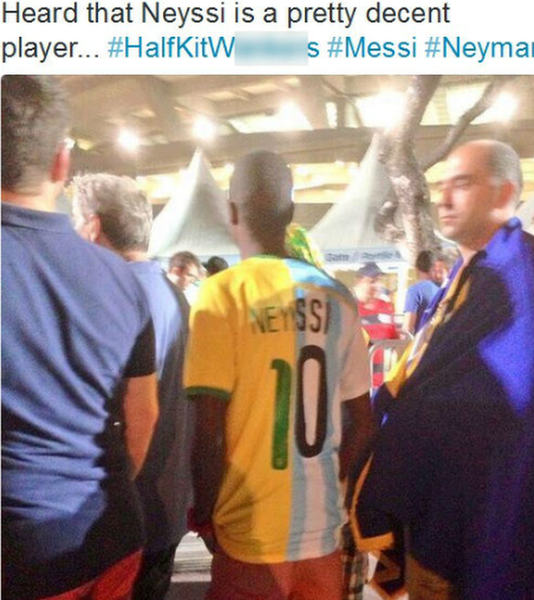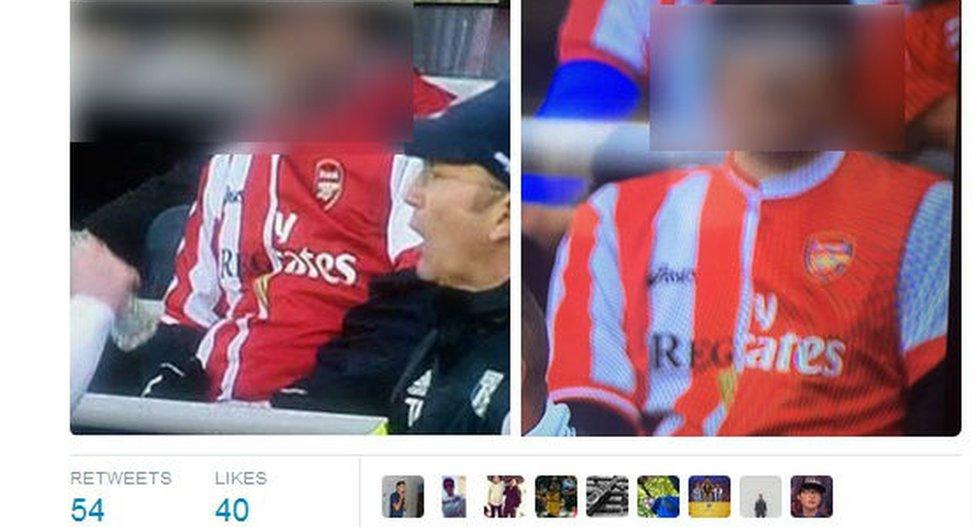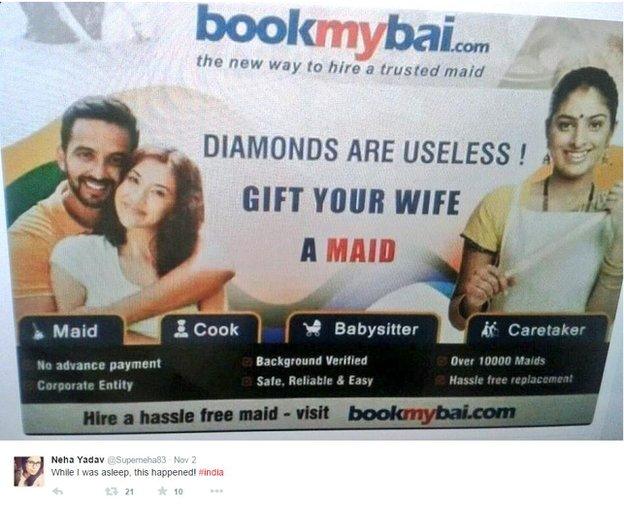Why do half-and-half shirts offend football fans?
- Published

A fan sporting a Brighton-Arsenal "half-and-half" shirt
If there's one subject guaranteed to divide the global public, it's the beautiful game.
But if you look at social media chatter, an emerging trend seems to be uniting thousands of football fans: a shared animosity to the emergence of the "half-and-half" football shirt.
These mysterious garments are essentially two half-kits, from two different teams, stitched together. They don't seem to be mass manufactured, but rather sewn together at home. Pictures of these one-off half-and-half kits keep emerging on Twitter and Facebook. Sometimes they commemorate both sides in a particular match, but often they simply show two different sides a fan supports. And some writers have argued, external that they represent a turn against tribal loyalty in football.

Follow BBC Trending on Facebook
Join the conversation on this and other stories here, external.

On Twitter, the term "half and half" has been tweeted 35,000 times in the last three months - and associated tags indicate that most of those tweets have been in the context of football.
Attention on half-and-half shirts seems to spike each time a new picture of one is posted online, or appears in the media, and the sentiment is largely negative.

Conversation in the UK spiked on September 13, when an unknown fan was spotted in TV footage at Sunderland's home ground, the Stadium of Light, wearing a shirt that showed both Sunderland and Arsenal colours. On that day, Sunderland were actually hosting Tottenham Hotspur. Online, some Tottenham supporters saw the shirt as a gesture meant to taunt them (given their rivalry with Arsenal).

These TV pictures were widely shared and retweeted
Before shirts started to emerge, half-and-half football scarves caused much debate over divided loyalty. These scarves are usually meant to commemorate individual fixtures and sold at grounds. Last month, one Manchester pub, external even went as far as banning them completely.
The next day, a Twitter account mocking "half-and-half culture" was set up anonymously - aiming to shame half-and-half wearers by sharing photos. On this feed, blurred and grainy camera phone images show mostly unsuspecting members of the public sporting a variety of novel combinations: Liverpool-Cardiff City, Manchester United-Chelsea and Liverpool-Hull, to name a few.
So what does the online animosity towards the half-and-half shirt tell us about football culture?
John Williams, an expert in the sociology of football at the University of Leicester, thinks these shirts cause offence because they hit at the core of how most football fans identify themselves. "It makes people look like consumers," he says, "the opposite of how most football fans like to think of themselves. Most fans still think support is an accident of birth.
"Where you are born or the influence of a parent connects you with a particular club. No matter how poorly they perform, you can't shake that," he told BBC Trending. "The idea that that's no longer important and that you can just choose a second club is really difficult."
Despite the visible online anger towards them, it seems that half-and-half shirts are growing in popularity. Supporters go to great efforts, external to have them made. Arena Scarves in Leicester makes the hybrid match scarves on sale at grounds. "We started doing them for international rugby, and it spread into English football. Our competitors picked up on it," partner Claire Dolan told BBC Trending. To her, the criticism of scarves and shirts shows an "outdated" approach to football fandom.
"Fans should get into the 21st Century," she says. "The old days of it being quite so tribal… we need to get away from that."
Blog by Alex Dackevych
Next story: The advert that said: "Gift your wife a maid"

An ad asking husbands to gift their spouse a domestic worker spread across Twitter and WhatApp in India
When a website advertisement suggested that husbands "gift" their wives a maid, it prompted a huge reaction online. READ HERE
You can follow BBC Trending on Twitter @BBCtrending, external, and find us on Facebook, external. All our stories are at bbc.com/trending.